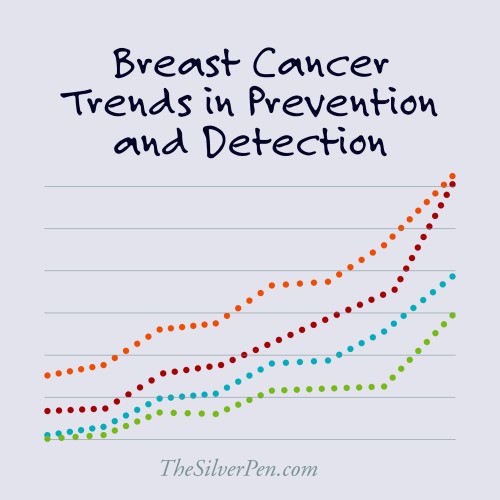 SABCS 2014: Breast Cancer Trends
SABCS 2014: Breast Cancer Trends
Recently, I had the opportunity to do an interview for an online publication about the trends in FBC prevention, detection and treatment that came out of the San Antonio Breast Cancer Symposium held in December. This – as I know you know – is the annual conference during which major outcomes in FBC research are presented. Much of the information is written in medical mumbo jumbo, so I took the liberty of translating a bit for you. Hope that you find it interesting!
- What is the latest on detection? A relatively unknown but incredibly important fact about breast cancer is that women with dense breasts are four times more likely to develop breast cancer. They also are much less likely to have their breast cancer detected with a mammogram. This is a big deal. And, it’s estimated that 40-50% of women have dense breasts. At the conference, researchers revealed data showing that using ultrasounds in women with dense breasts potentially increased the ability to diagnose cancers that might not have been seen on screening mammograms alone. While the debate continues about the efficacy of early detection and whether or not it saves lives, this study reiterates the need to talk with your doctor about proper screening and what steps you can take to reduce your risk of developing breast cancer.
- What are some trends in breast cancer treatment? Even though breast cancer is commonly referred to as a single disease, the reality is that there are many of different types of breast cancer. Yes, they all start in the breast, but after that? Well, tumor cells have their own agendas. Triple-negative breast cancer is a particularly aggressive type that is typically difficult to treat, although it can often be treated successfully if caught early. An interesting study revealed that people with triple-negative breast cancer may benefit from taking a combination of the drug carboplatin and standard chemotherapy prior to surgery. Often people are given chemotherapy before surgery to help shrink tumors so that they can be surgically removed. For women with metastatic breast cancer, the FERGI Phase II study provided an interesting (and hopeful!) finding. Researchers found that adding something called a PI3K inhibitor to treatment may delay the cancer’s progression. It works by blocking a pathway often associated with cancer growth. This study was especially effective in women with both estrogen and progesterone receptor positive cancer.
- Is there anything new on prevention?
- An interesting study found that breastfeeding does reduce the risk of breast cancer. Further, results showed that even if women breastfed for only a short time, that they still received the benefit.
- And, on the food front, one study that surprised me was the Women’s Intervention Nutrition Study (WINS). This study began in 1994, and looked at the effect of a low-fat diet on breast cancer risk reduction and risk of recurrence. The findings showed that eating a low fat diet for five years did not improve survival in the overall population of women. But those with hormone receptor negative breast cancer did see a 54% improvement in overall survival. In other words, women who had estrogen and progesterone negative tumors who were on a low fat diet for five years lived an average of 1.9 years longer than women who did not make changes to their diet. The bottom line: doctors and researchers agree that anyone who has had breast cancer needs to focus on maintaining a healthy weight to reduce the risk of the cancer returning.


I apologize if I have commented on this before but I think it is so important to get the message out about dense breasts. I was diagnosed with FBC in June of 2012. I was lucky to find the lump on my own. I always knew the general landscape of my breasts and one just felt a little off that day. I had been having mammograms for five years and had never been told I had dense breasts or that I had an increased risk. The day I want in to the breast clinic I had a mammogram and they saw nothing of my tumor which ended up being 2cm. It wasn’t until they did an ultrasound that it was detected. Anyway, I know now it is mandatory in many states to tell women about dense breasts but honestly as I speak to women most of my friends have do idea that this is a risk factor. Lets spread the word.
THANK YOU for commenting, Jennifer. Let’s spread the word indeed!!!
really nice article on breast cancer trends….strongly agree that breastfeeding reduces the risk of breat cancer, also weight loss will help females to live a healthy life…http://www.cpccodingbilling.com/
Thanks for writing!